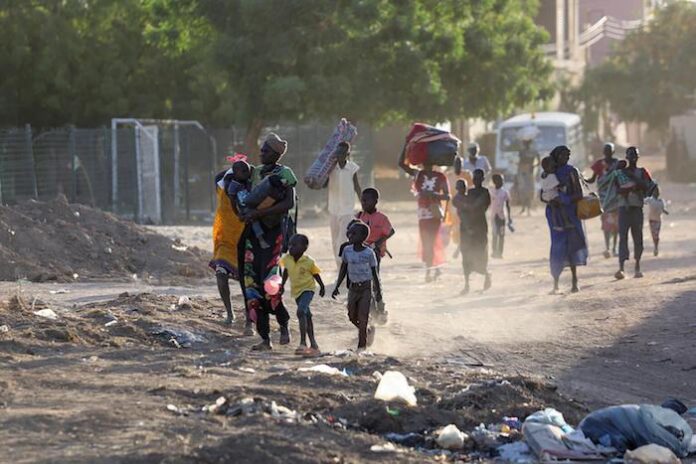As fighting intensifies, UNICEF remains committed to providing vital support and services to vulnerable children and families both in Sudan and in neighboring countries.
On April 19, 2023, people flee their neighborhoods amid fighting between the army and paramilitaries in Khartoum, Sudan.
© UNICEF/UN0831619/AFP
Children exposed to recruitment and use by armed groups, sexual violence
Escalating armed conflict in Sudan is rapidly worsening an already dire humanitarian situation for millions of children.
At least nine children have reportedly been killed and more than 50 injured since fighting between the Sudanese Armed Forces and paramilitary Rapid Support Forces began on April 15. Hostilities in Khartoum, the Darfurs and North Kordofan are displacing families and further exposing children to recruitment and use by armed groups, as well as sexual violence.
Access to essential supplies — food, bottled water, medicine, fuel for cooking and cars — is limited. In some areas, prices have risen by 40 to 60 percent, sometimes more.
UNICEF priorities: child protection, health care, essential supplies
Despite the challenges faced by the ongoing crisis, UNICEF is committed to providing vital support and services for children and families in need in Sudan and those who have fled to neighboring countries.
UNICEF’s top priorities include:
- ensuring safe passage and protection for children
- maintaining access to health care and other critical services
- responding to new humanitarian needs, including emergency education supplies and psychosocial support
Children and families fleeing violence need urgent humanitarian assistance
According to UNHCR, about 270,000 people are expected to flee Sudan into neighboring countries including the Central African Republic, Chad and Egypt.
Some 20,000 have already streamed across the border into Chad and more are arriving every day. Refugees in the village of Koufroun, Chad, already outnumber the villagers, putting immense pressure on local resources.
No rain in six months, and a shortage of safe drinking water
With temperatures climbing above 100 degrees Fahrenheit, access to safe water is a crucial concern. Lack of safe water increases the risk of waterborne disease outbreaks, including cholera.
“The refugee population there has literally nothing,” said Donaig Le Du, UNICEF Chad’s Chief of Communications. “They’re sitting on the border. There’s no shelter. There’s nothing. It’s extremely hot. It hasn’t rained in over six months. So these are very dire situations, and UNICEF is on the ground and doing anything to help.”
UNICEF and partners are working to provide safe drinking water and distributing much-needed essential supplies including mats, blankets, cooking kits, mosquito nets, water containers and soap to refugees.
On April 27, 2023, women and children fleeing violence in Sudan rest under a tree in the village of Koufroun, Chad, on the Chad-Sudan border.
© UNICEF/UN0834352/Le Du
1 in 3 health centers in Sudan no longer functioning
Before the current conflict, some 15.8 million people in Sudan required humanitarian assistance. The nation has one of the world’s highest rates of child malnutrition; 2.7 million children were already malnourished. The conflict has disrupted the lifesaving treatment of an estimated 50,000 children suffering from severe acute malnutrition.
Seven million children were already out of school before the nation’s schools shut down completely. Some 70 percent of 10-year-olds could not read or understand a simple sentence.
According to the World Health Organization, one-third of the nation’s health care facilities are no longer functioning, depriving children and their families of essential health care.
Constant cuts in power and fuel are jeopardizing the cold chain that keeps vaccines at optimal temperatures during transport and storage, putting at risk the lives of millions of children in a country where vaccination rates were already falling and where children face regular disease outbreaks.
Millions of under-vaccinated or zero-dose children will miss out on lifesaving vaccines, exposing them to deadly and debilitating diseases like measles and polio.
n the Chadian village of Koufroun, UNICEF WASH Officer Rodolphe Houlsonron is part of a team working to provide safe drinking water for refugees arriving from Sudan.
© UNICEF/UN0834348/Le Du
Children in Sudan need peace, not violence
“Children are bearing the brunt of the conflict in Sudan,” said Mandeep O’Brien, UNICEF Representative in Sudan. “They are dying, and their futures are being taken away from them. The impacts of preventing vulnerable children from receiving health, protection and education services will last a lifetime. The fighting must stop so we can urgently better reach all vulnerable children wherever they are.”
Help UNICEF reach children caught in conflict with the urgent support and services they need. Your contribution can make a difference. Please donate.


